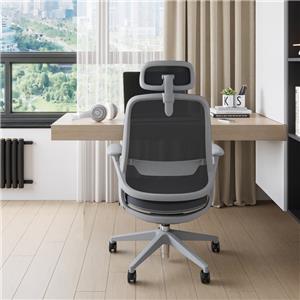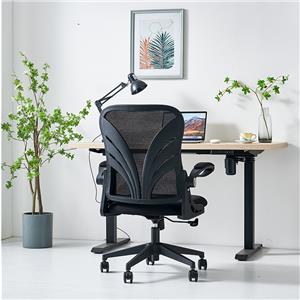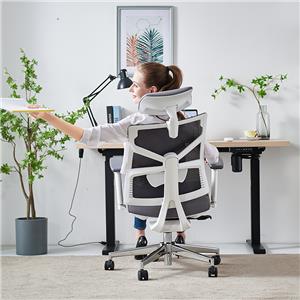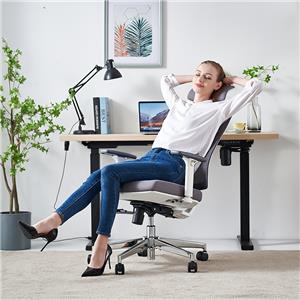What types of office chairs are there?
Office chairs are something we all take for granted. They are always there and we only notice them when they are broken. But in fact, they play an important role in our lives. Not only do they impact our productivity, they also directly impact our health.
Today, there are endless types of office chairs to suit the various needs of different occupations and workplaces. In this article, we’ll explore the most common types and how they perform in the ergonomics department.
List of office chair types
Ergonomic chairs/sitting postures that help prevent musculoskeletal disorders
Executive Office Chair/Gorgeous Executive Style Chair
Mesh office chair/made of mesh with excellent breathability
Large and tall chairs/caters to large users of large sizes and heights
Small chairs / catering for small users
Conference chair/suitable for company meetings
1. Ergonomic chair
Ergonomic chairs are specially designed to encourage you to maintain a neutral posture and provide adequate support when you work in the office for long periods of time. While they typically cost a little more than other types of office chairs, you can save more in the long run because many are optimized to prevent conditions such as cervical spondylosis, back pain, poor posture, and circulation.
Common feature:
Lumbar support
Adjustable headrest, armrests and seat height
Easy rotation
stable foundation
Padded seat and backrest
sliding seat pan
Adjustable tilt tension and lock
Nylon carpet casters
2. Executive office chair
Of all types of office chairs, executive chairs are often the most luxurious. As the name suggests, executive office chairs are often used by superiors. Its design has an imposing appearance, with a high backrest and plenty of cushioning in the backrest, seat and headrest, often made from high-quality materials such as fine wood and genuine leather.
Today, the lines between ergonomic office chairs and other types of office chairs are often blurred. When it comes to executive chairs, be it the seat or upholstery, thick upholstered armrests, and PU or leather upholstery on the chair. Some even come with additional features like reclining or massage heads.
Common feature:
PU or genuine leather material
Thickened armrests
wood veneer
Beside the waterfall
Thick contour or layered cushions
3. Mesh office chair
Mesh office chairs are the epitome of breathability, making them a great choice for those who tend to sweat while working. The backrest is lined with this mesh fabric and features a padded seat for comfort. The premium mesh office chair is also designed with ergonomics in mind, with waterfall edges that promote blood circulation and lumbar support to minimize lower back pain.
4. Big, tall chairs
Large and tall office chairs are designed for large and tall people. They feature high load-bearing capacities, ranging from 300 to 1,000 pounds. This means everything about the chair is designed to handle heavy loads safely.
This type of chair comes with a taller and wider backrest, higher seat height adjustment, thicker padding, wider seat, and reinforced frame, base, and armrests.
Best for: Tall and heavy people.
Common feature:
Heavy duty frame
Extra wide deep seat
high backrest
long and wide armrests
5. Small chair
If there are chairs for adults and tall people, then there are certainly chairs for little people and little people. Compact chairs have a smaller seat, a small base, and a lower air lift so smaller people can put their feet on the floor.
Even the ergonomic features have been adjusted to meet the needs of people of shorter stature. When using a standard office chair, petite office workers may find it more difficult to maintain proper arm alignment due to the taller armrests. Small chairs solve this problem because the height of the armrests is much lower. The same goes for head restraints, lumbar support and seat depth.
Common feature:
Providing the correct seat height and angle for smaller people
Seat width and depth for petites
Adjustable lumbar support
Armrest height lower limit range
lower air lift
6. Conference chair
Meeting rooms are where you brainstorm with your team, make important decisions and entertain guests. In order to create a wider space and avoid obstructing people's sight lines, conference chairs are usually designed with low or medium backrests. Unlike other types of office chairs, many conference chairs promote a forward posture by tilting the seat slightly forward. This is to encourage people to participate and contribute to the meeting.
Best for: Conference rooms, boardrooms and boardrooms
Typical Materials: Leather or fabric upholstery, memory foam padding, mesh
Common feature:
Adjustable seat height
Low or mid-high backrest
leaning forward chair
Adjustable tilt tension
rotate
Nylon casters




